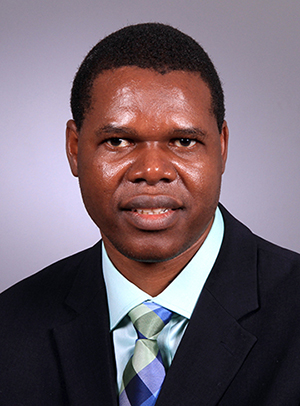
The largest provider of business education in Africa and one of the largest in the world

Prof Godwell Nhamo, Chief Researcher and Exxaro Chair, Institute for Corporate Citizenship, College of Economic and Management Sciences
Prof Godwell Nhamo, Chief Researcher and Exxaro Chair in the College of Economic and Management Sciences at Unisa, never ceases to amaze the university with his outstanding research studies. He is one of the recipients of the 2019 Chancellor's Award for Excellence in Research, his third to date. "We do not do this for money, but to contribute to the body of knowledge," sums up his go-to-it research attitude.
Nhamo’s academic journey is enshrined in more than 22 years of life and work at universities and research institutions such as the Council for Scientific and Industrial Research (CSIR). Since joining Unisa in 2009, he has risen through different ranks within the institution, has identified himself with many other progressive Unisans, and is happy to be part of this great and forward-thinking institution. According to him, every Unisa academic has the inherent capacity to grow into a reputable researcher. He reiterates that what is needed is commitment and consistency in undertaking research. He appreciates the research environment that Unisa provides and is positive that many top academics will emerge from the system in due time.
His research centres on climate governance, the green economy and sustainable development. To this end, much work has been carried out drawing from the Climate Action Sustainable Development Goal (Goal 13) and how this links to the rest of the other 16 Sustainable Development Goals (SDGs). Since climate change impacts on all the other SDGs, this research positioning provides a thread to many topics to work on. He encourages researchers not to only think of research ideas but to also express them on paper.
"Receiving the 2019 Chancellor's Award for Excellence in Research provides a moment of happiness to any academic at Unisa, to one's family and other support systems. It also confirms that somebody somewhere recognises the good work one is doing. For my college, CEMS, this propels it on the Unisa research radar. However, it cannot be possible if my line managers and Unisa management at large do not provide the necessary spaces of research engagement, especially the Unisa Research Portfolio," expressed Nhamo.
Nhamo acknowledges that it is challenging for academics to write their first paper but believes that once the threshold of this inaugural paper is reached, the next set of papers is relatively easy to conceptualise and finalise. Through his experience and self-mentoring, he realised that there is a quicker way to have emerging researchers find their work into top academic journals. He says it might involve partnering with a seasoned researcher, thereby gaining understudy mentoring. For Nhamo, in academia, scholars must appreciate critical observations on their manuscript and live with them, including frank assessments indicating that the manuscripts might not make it to the targeted high-impact journals if more work is not done. The golden rule is to be disciplined and complete one manuscript at a time.
He encourages researchers to have one good manuscript that pushes knowledge boundaries rather than many that express the same ideas. "To develop into a quality researcher requires patience, making errors and rising again. Top academic journals drain an author in many ways, including the time that reviews take (some up to more than a year for feedback), many revisions demanded by editors, and, at times, rejections from a provisionally accepted paper. This kind of a journey demands that a researcher should stay calm, on course, and have several manuscripts in the peer-review system."
In terms of what we can look forward to, Nhamo says there is much work focusing on the SDGs, climate governance and climate change and tourism. So far, two edited books have been published in 2020, namely, Sustainable Development Goals and institutions of higher education and Scaling up SDGs implementation. The third co-authored book, SDG 7: Ensure access to affordable, reliable, sustainable and modern energy, will soon be published through Emerald.
* By Nancy Legodi, Acting Journalist, Department of Institutional Advancement
Publish date: 2020-03-11 00:00:00.0